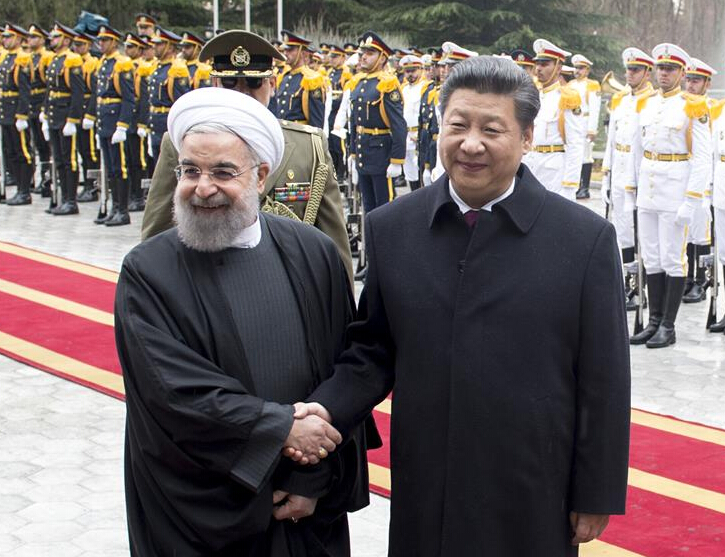Opinions on President Xi's Middle East Trip
- By Wei Jia
 0 Comment(s)
0 Comment(s) Print
Print E-mail China.org.cn, January 26, 2016
E-mail China.org.cn, January 26, 2016
|
|
|
Chinese President Xi Jinping (R front) attends a grand welcome ceremony before talks with Iranian President Hassan Rouhani (L front) in Tehran, Iran, Jan. 23, 2016. [Xinhua/Wang Ye] |
Chinese President Xi Jinping chose the Middle East as destination for his first overseas trip in 2016. The significance of this is profound, as comments made by experts and officials show.
1. Belt and Road
At the junction of the New Silk Road Economic Belt and 21st Century Maritime Silk Road, the Middle East stands to gain much from the Belt and Road initiative put forward by China in 2013. Extensive agreements signed between China and Middle East countries during Xi's trip, namely Saudi Arabia, Egypt and Iran, attest to the enormous potential for cooperation in the region to the mutual benefit of all parties along these ancient routes of commerce and trade. And as is pointed out by some observers, both China and the Middle East can offer the other side something highly important.
Farzam Kamalabadi, president of Future Trends International (Group) Corp, says that coming right after the inauguration of Asian Infrastructure Investment Bank, President Xi's visit signals the official launch and execution, as well as deeper implementation, of the Belt and Road initiative, which has far-reaching strategic implications.
Zhang Jingwei, a researcher of Charhar Institute, argues that in recent years, major petroleum exporting countries in the Middle East have faced challenges from a sluggish economy and revenue reduction due to a continuous oil price slump amid a glut of supplies. Meanwhile, the Chinese economy has entered the "New Normal" stage with worsening overcapacity and reduction in demand. So China's technology and extensive capacity can help promote infrastructure construction and economic restructuring in the Arab world.
Hua Liming, former Chinese ambassador to Iran and an expert in Middle Eastern studies, believes that the Middle East has a lot of potential to deepen cooperation with China. For example, the Middle East lags behind in infrastructure and manufacturing industries but has huge oil reserves, while China is just the opposite. Therefore, China needs the Middle East to secure its energy supplies and implement strategic projects."
Dr. Mohamed Hassan Saeed, a Sudanese political analyst and lecturer of political science at a number of Sudanese universities, thinks the Belt and Road initiative could bring together economies of the region, increase growth rates and enhance the Middle East countries' ability to face risks."







Go to Forum >>0 Comment(s)